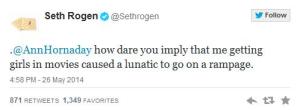Movies and Influence – Trying to Have it Both Ways
“We all know the power that a film can hold. It can inspire, enlighten, and even, at times, enrage. The ability of film to invoke strong emotions from a worldwide audience is seen time and again through successful film phenomenon: these are the kind of films that take the world by storm, grab our attention, and never let go.”
http://www.thescriptlab.com, Top 10 Films that Changed the Social Landscape
Many things are being said around and about the Elliot Rodger shooting. The one I want to focus on is a twitter fight going on between actor Seth Rogan and Washington Post author Ann Hornaday. In her column, Ann writes that among other factors affecting Rodger, he was influenced by the movies he saw and worked with. “Indeed, as important as it is to understand Rodger’s actions within the context of the mental illness he clearly suffered, it’s just as clear that his delusions were inflated, if not created, by the entertainment industry he grew up in.”
Having specifically mentioned the movie Neighbours as an example, lead actor Seth Rogen took umbrage and started blasting Hornaday on twitter.
We’ve roasted marshmallows around this fire before, along with video games as well. Columbine and Virginia Tech both had media firestorms over what, if any, influence do games and movies have on these events.
The standard response by the accused parties is what you see in all those articles – shock and offense that they could be linked in any way to these events. These are just movies, just games. It’s entertainment.
This blanket rejection of any link and refusal to even look at the issue is disingenuous on the media companies’ part. When the message is positive, Hollywood is all too happy to take credit for its role.
From the movie Crash, actor Matt Dillon said, “there’s a deeper reason for this film to be made.” Director Paul Haggis said, “A good film makes you ask questions of yourself as you leave the theatre.”
From director David Russell on the Silver Linings Playbook:
I went on Chris Matthew’s show, and he said people reach out to him and say they appreciate the ability to talk about these things they’ve been through that they haven’t really spoken about as openly. It’s a door opening for people who suffer silently with this, who have traumas that they handle privately in their families.
and
And it means the world to me that people have connected with the film and are coming forward and speaking about it, and that the film has found a life… and it’s continued to find its audience and continued to build, and I’m happy for the film and for any family who can relate to it in any way.
To reach back in time a bit, NPR commented on the 50 year anniversary of the book and movie To Kill a Mockingbird
“The questions raised by the book were part of a conversation that echoed around the country. It’s a conversation that is still going on, and the book endures because people can relate to it in so many different ways.”
From thescriptlab.com article above, looking at Birth of a Nation, “Birth of a Nation proves that as much as a film can sow the seeds of enlightenment and understanding, so too can cause an influx of ignorance and hate.”
Films influence. Books influence. Art influences.
Was watching Neighbours the inciting incident that set off this tragedy? Of course not. These events are never the result of a single issue. But Hollywood clearly embraces the fact that their product can speak to and influence their audience. They need to speak to the fact that the influence they peddle isn’t always good. That’s not a reason to stop making those kinds of movies, and only produce happy, inspirational pap. But it does mean recognizing that having a sociopathic person with homicidal tendencies watching a movie about mass murder is probably not good for anyone involved. It means consistently pumping out movies showing disaffected marriages where the people find fulfillment through cheating or divorce can affect peoples’ expectations of what married life is supposed to be like. It means acknowledging that this affects our society, and talking to related parties about what we can and should do about it.
You don’t get it both ways. You can’t claim credit for sending positive messages, but say the negative has no impact whatsoever. “A good film makes you ask questions of yourself as you leave the theatre.” Sometimes the questions aren’t good. Sometimes the answers aren’t good. Own up to this, get involved. Sometimes the stories we need to hear are the bad ones. Sometimes we need to ask the bad questions. Let’s talk about what that means and how we should hear it, and not just point the finger at someone else whenever those questions go badly.



This is a very good point, well-expressed. I remember once looking through an list of the ‘the top most romantic film moments of all time’ because I was having an argument with a friend about all the reasons I hated The Notebook, and being horrified at how many of these ‘top most romantic’ things were to do with cheating, or displayed borderline abusive behaviour, or in some other way were grossly unhealthy. It is true that Hollywood is all too quick to take credit for the positive things.
I’ve had a half-written post about this sitting on my hard drive since before I had a blog. It might be time to tidy it up and post it.
I totally agree wih you on romance films. It drives me nuts how many of them essentially promote infidelity and divorce. The Notebook, Pride and Prejudice, half of Julia Roberts’ movies…
You should totally finish off that post, and fire us a comment when it’s done. I’d love to hear what you have to say.